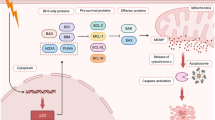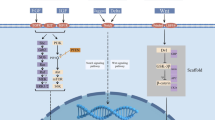Abstract
Development of effective therapeutic modalities for the treatment of human cancer relies heavily upon understanding the molecular alterations that result in initiation and progression of the tumorigenic process. Many of the molecular changes identified in human prostate tumorigenesis so far play key roles in apoptosis regulation. Apoptosis represents a universal and exquisitely efficient cellular suicide pathway. Since the therapeutic goal is to trigger tumor-selective apoptotic cell death (without clinically significant effects on the host), elucidation of the mechanisms underlying apoptosis deregulation will lead to the identification of specific cellular components for targeting therapeutic interventions. As our understanding of its vital role in the development and growth of the prostate gland has expanded, numerous genes that encode apoptotic regulators have been identified that are severely impaired in prostate cancer cells. In addition, the expression of apoptotic modulators within prostatic tumors appears to correlate with tumor sensitivity to traditional therapies such as hormonal ablation and radiotherapy. No strict correlation between apoptosis induction and a patient's long-term prognosis has emerged, perhaps due to the fact that the ability to achieve initial remission alone does not adequately predict long-term outcome. This review will encompass the known molecular changes intimately involved in the apoptotic pathway which have potential prognostic value in disease progression, as well as therapeutic significance in the enhancement of the apoptotic response to novel and established treatment strategies for the treatment of androgen-dependent and androgen-independent prostatic tumors. The main focus will be on the role of the transforming growth factor-β (TGF-β) signaling pathway, bcl-2 and the bcl-2 family members, the caspase cascade (apoptosis excecutioners), and the Fas pathway in induction and regulation of apoptosis following therapeutic stimuli for the management of advanced prostate cancer.
Similar content being viewed by others
Author information
Authors and Affiliations
Additional information
Electronic Publication
Rights and permissions
About this article
Cite this article
Bruckheimer, E., Kyprianou, N. Apoptosis in prostate carcinogenesis. Cell Tissue Res 301, 153–162 (2000). https://doi.org/10.1007/s004410000196
Received:
Accepted:
Published:
Issue Date:
DOI: https://doi.org/10.1007/s004410000196




